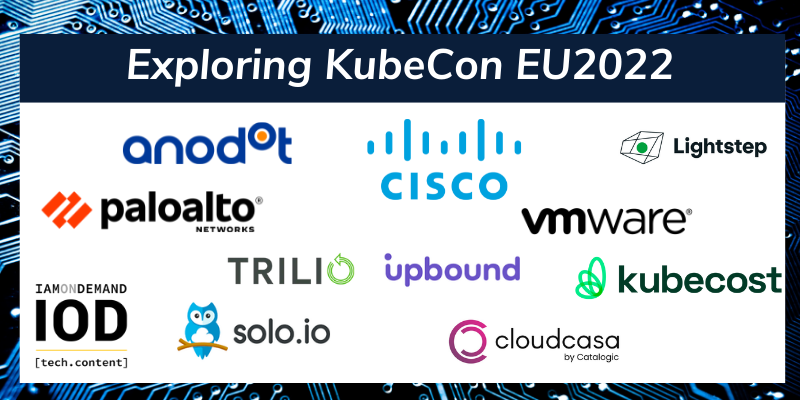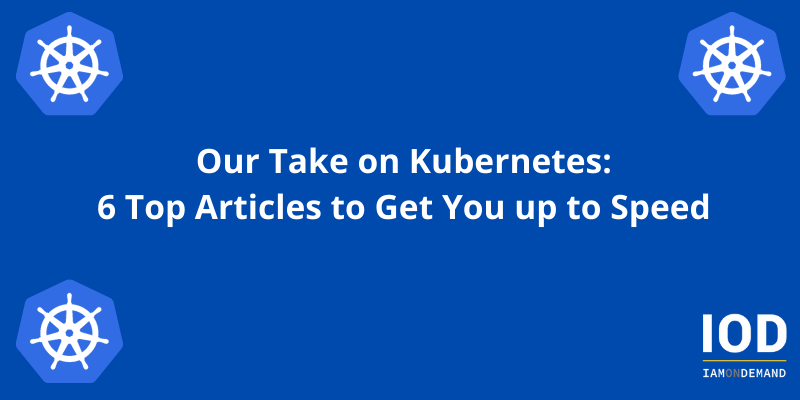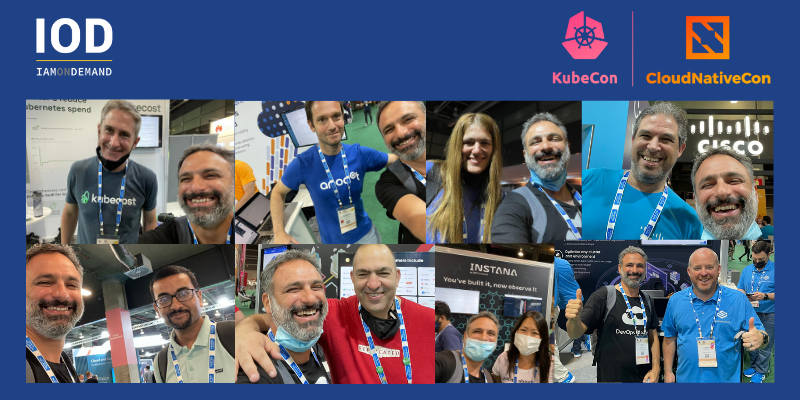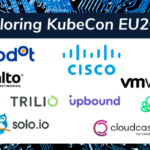Attending conferences is one of the best ways to see what’s cutting-edge in tech—and our first visit to KubeCon and CloudNativeCon was incredible!
At IOD, we love going to conferences, but not just for the amazing presentations or workshops; by walking the show floor, we get the opportunity to discover new technologies, meet with representatives, and see demos showing expo vendors’ solutions. That gives us the opportunity to share companies doing interesting work with you, just like we did for the AWS re:Invent and Cybertech Global TLV 2022 conferences!
This year, Kubecon + CloudNativeCon Europe took place in beautiful Valencia, Spain (though, attendees still had the option to experience the conference virtually, too). The conference featured five days of riveting presentations, great conversations on the show floor, and engaging workshops from May 16 to 20. An impressive 26,000+ total registered attendees—including nearly 7,000 in-person attendees—and 9,000+ companies from the cloud-native community came together to discover what’s coming next in this transformational space.
So many companies are doing incredible work that’s leaving an indelible mark in the cloud computing industry, and it was so cool to meet the brains behind these innovative brands.
Here’s a look at some of the organizations IOD CEO Ofir Nachmani spoke to that are leading the way for cloud computing in 2022.

ServiceMeshCon—the part of the conference focused on adopting a service mesh for application networking and improving product deployments—was dominated by Solo.io. This company is helping organizations connect, manage, and secure microservices and Kubernetes containers across their entire IT infrastructure. It was so exciting to meet with CEO Idit Levine, CMO Erik Frieberg, and VP, Global Field CTO Christian Posta and see their solution in action!

It was clear from Solo.io’s presentations during the conference that they’re already a mature leader in the emerging Kubernetes security field. As a Silver Sponsor, the leaders at Solo.io demonstrated their expertise during a keynote talk, engaging workshops, and several panels and discussion sessions. One good example was a hands-on workshop they hosted on using Envoy—an open-source edge and service proxy—to explain how Envoy supports many of the meshes and API gateways disrupting the Kubernetes security landscape. Plus, their virtual booth was as popular as their sizable physical booth on the show floor—online attendees experienced additional opportunities to learn from Solo.io’s expert team.
About the company: Solo.io, the modern service connectivity company, delivers application programming interface (API) infrastructure software that makes it easy for your architects and engineers to manage application traffic. Solo builds on open-source Envoy Proxy and Istio to give you comprehensive API gateways and service meshes that work everywhere, at any scale. (Source: Solo.io)
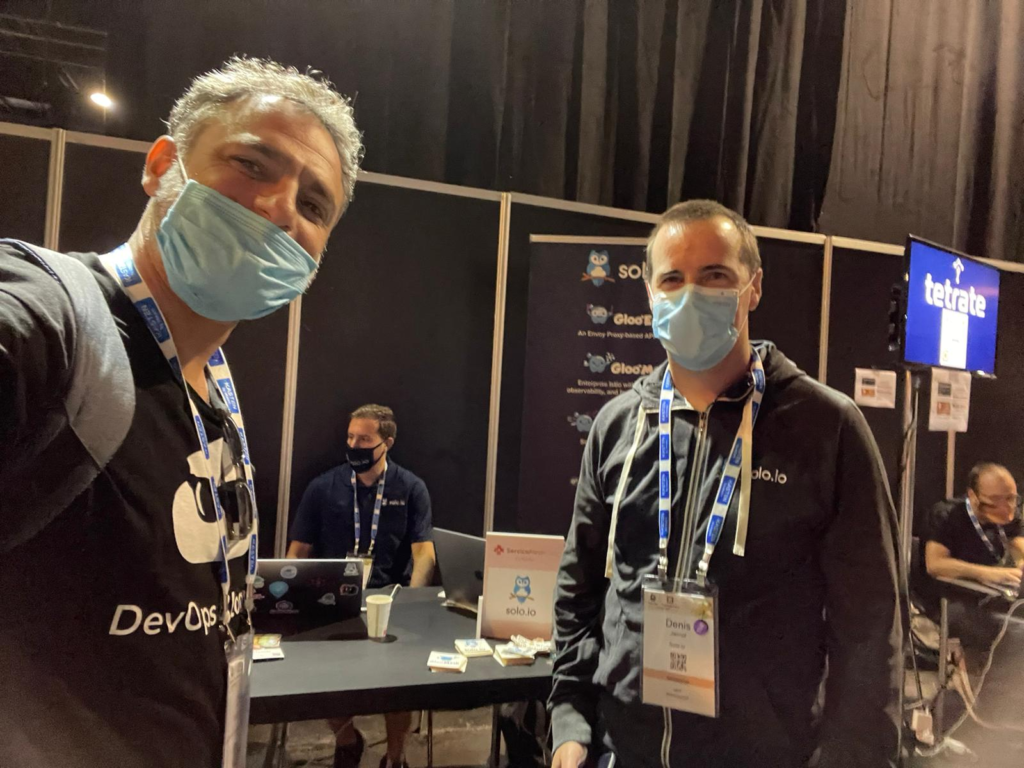

As much as everyone at KubeCon loves the capabilities Kubernetes clusters offer, many of us have also seen how quickly Kubernetes costs can rise. Monitoring and optimizing resource deployment is essential to keep cloud costs from ballooning, and Kubecost is helping organizations gain real-time visibility into cloud spend.
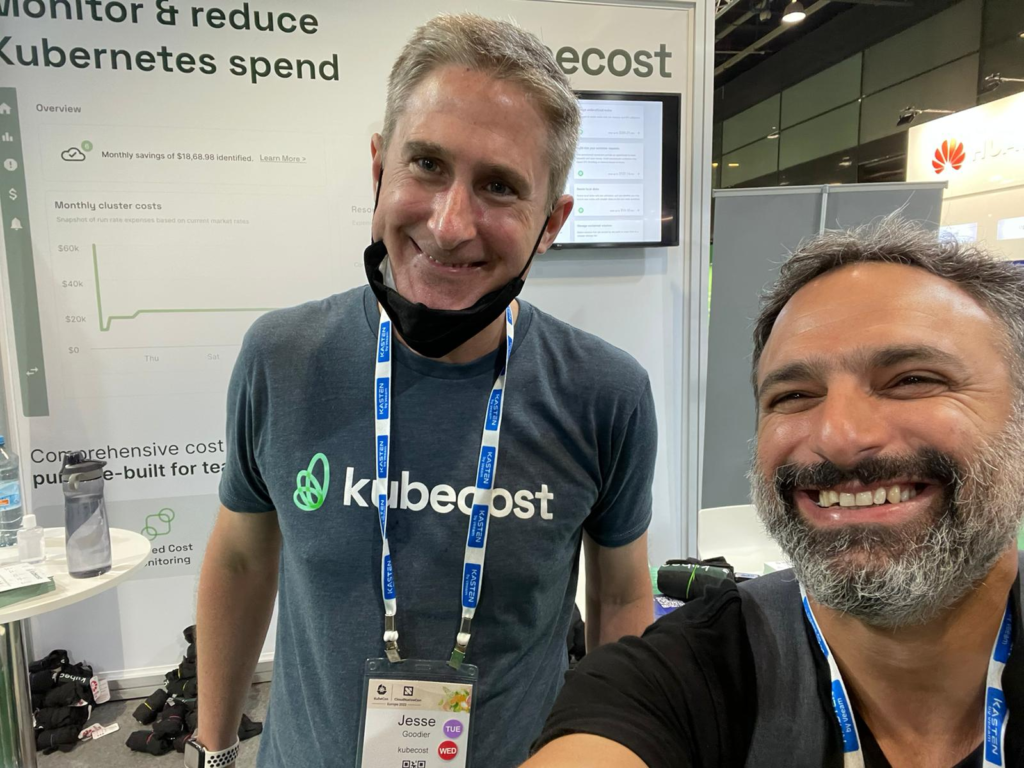
It was awesome to meet with the Kubecost team and see how they’re helping companies reduce the costs of their Kubernetes clusters and save millions of dollars. While at their booth, Solutions Engineer Jesse Goodier showed us one of their most popular optimization features—Recommended Request Sizing—in action. This handy tool makes it easy to identify over-requested resources with real data from live containers in your cluster; with just one click, you can instantly make changes to reduce your spend.
There’s a reason we featured this team in our excellent Kubernetes content blog post. These industry experts create content that helps organizations take full advantage of Kubernetes without breaking the bank.
About the company: Kubecost started in early 2019 as an open-source tool to give developers visibility into Kubernetes spend. Today, they empower more than 1,000 teams at companies of all sizes to monitor and reduce costs while balancing cost, performance, and reliability. (Source: Kubecost.com)
Related Kubernetes Articles

As veterans in the cybersecurity space, we couldn’t miss the opportunity to stop at the Palo Alto Networks booth and meet some of the leaders shaking up the Kubernetes security industry. After six acquisitions—including the recent addition of the open-source DevOps platform Bridgecrew—and introducing elements like compliance and CI/CD integration, Prisma Cloud/Palo Alto Networks is clearly working on creating full-scale solutions for cloud security. Just take a look at this three-year security strategy example they showed off at their booth!
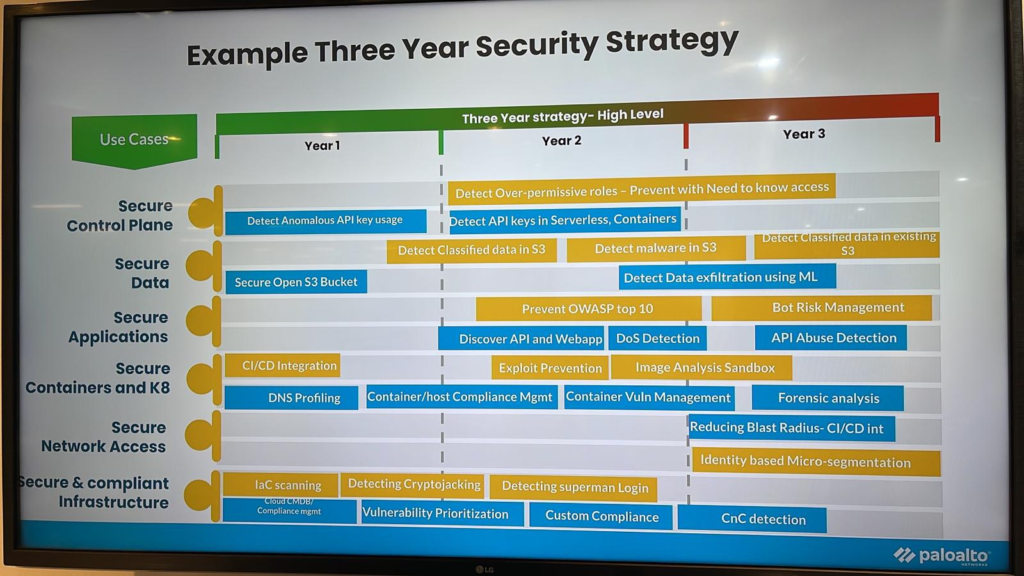
Prisma Cloud’s Grace Cheung did a great job walking us through their solution. But their booth wasn’t the only interesting thing Palo Alto brought to KubeCon 2022. Researchers Yuvul Avrahami and Shaul Ben Hai also gave a keynote presentation on detecting and mitigating Trampoline Pods. This engaging demo showed attendees what happens when a node goes rogue and attacks a Kubernetes cluster—a cutting-edge and must-know topic for anyone using popular K8 platforms.
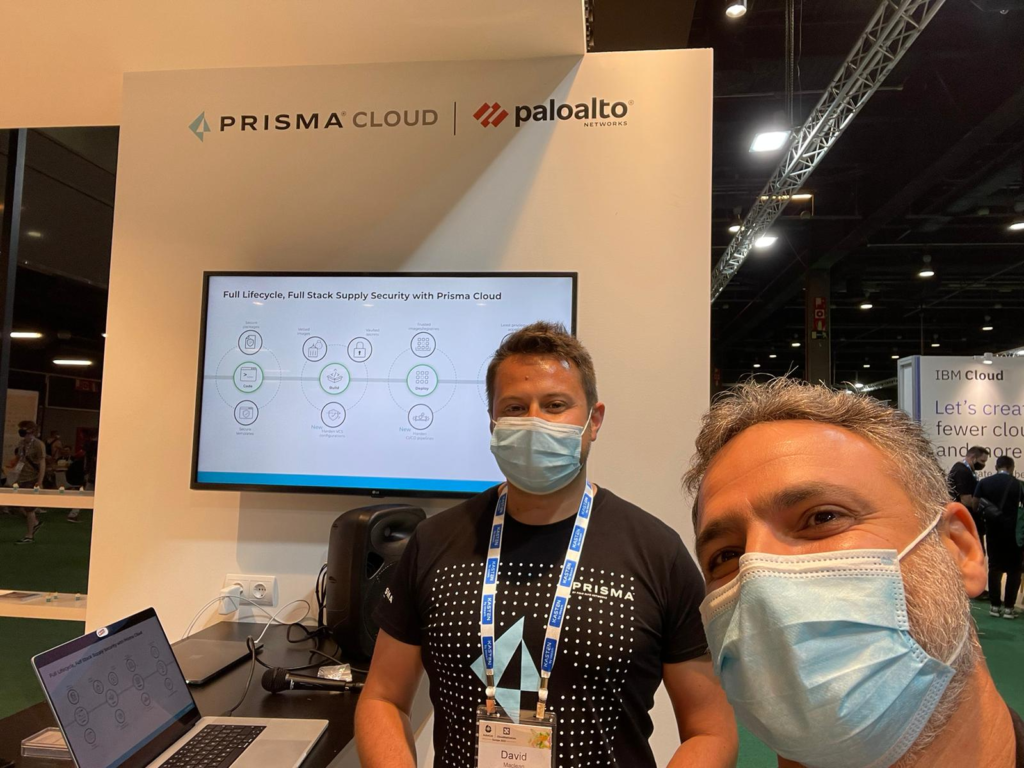
About the company: Palo Alto Networks, the global cybersecurity leader, is shaping the cloud-centric future with technology that is transforming the way people and organizations operate. Our mission is to be the cybersecurity partner of choice, protecting our digital way of life. We help address the world’s greatest security challenges with continuous innovation that seizes the latest breakthroughs in artificial intelligence, analytics, automation, and orchestration. (Source: PaloAltoNetworks.com)


During the conference, Lightstep also participated in a panel discussion with representatives from Amazon, Dynatrace, and Splunk about the future of the open-source software and how it can support security professionals leveraging microservices. This presentation offered attendees valuable insights into what teams can expect from upcoming platform updates. It was clear from their presentation how easy Lightstep makes it to get started using OpenTelemetry for managing performance and identifying the root cause of IT issues, even across Kubernetes containers.

About the company: Lightstep’s reliability platform is the easiest way for developers and SREs to monitor system health, understand changes, respond to incidents, and accelerate release velocity in cloud-native applications. (Source: Lightstep).

After Anodot’s recent acquisition of Pileus—a cloud cost optimization and management platform—the organization’s business monitoring tools have become even more impressive. On the show floor, Anodot’s Director of Data Gabriel Goldman showed us their newly combined platform for multi-cloud cost optimization, and it really impressed us. It’s interesting how this tool can see K8s spend and performance on the granular node level, making Anodot’s existing monitoring capabilities even more powerful.
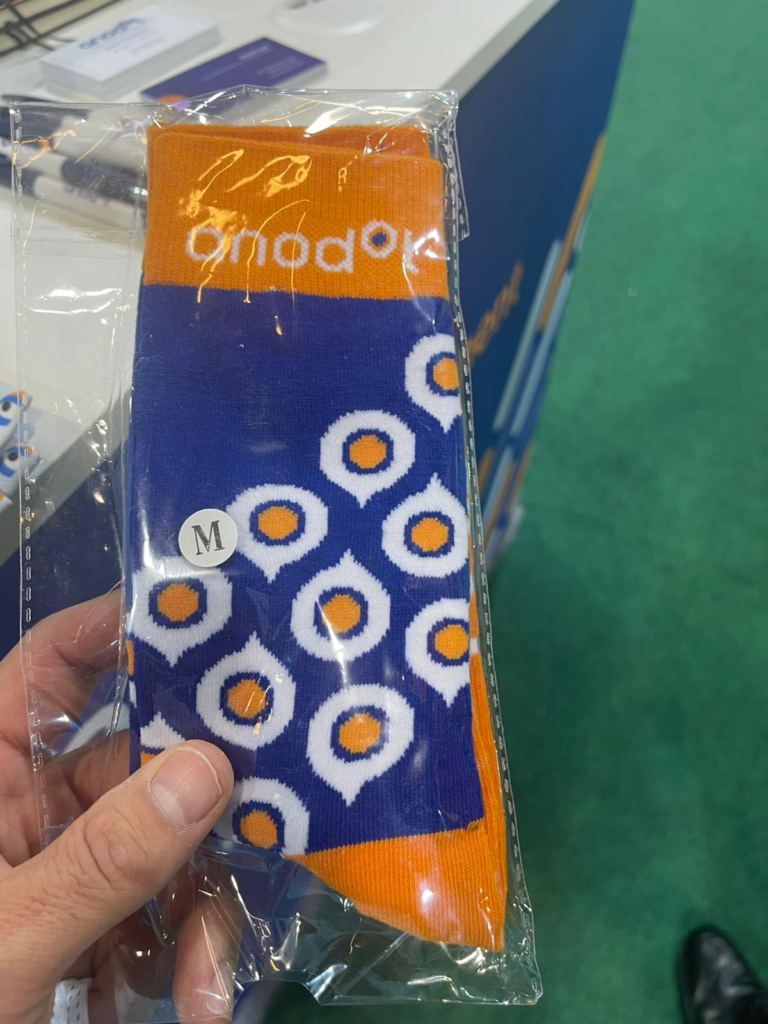
Needless to say, their booth was busy; the Anodot team met with hundreds of AWS users to demonstrate how their platform can reduce overall cloud spend. Plus, these branded socks were some of the best swag we received all week. We’re looking forward to seeing what Anodot and Pileus can do together!
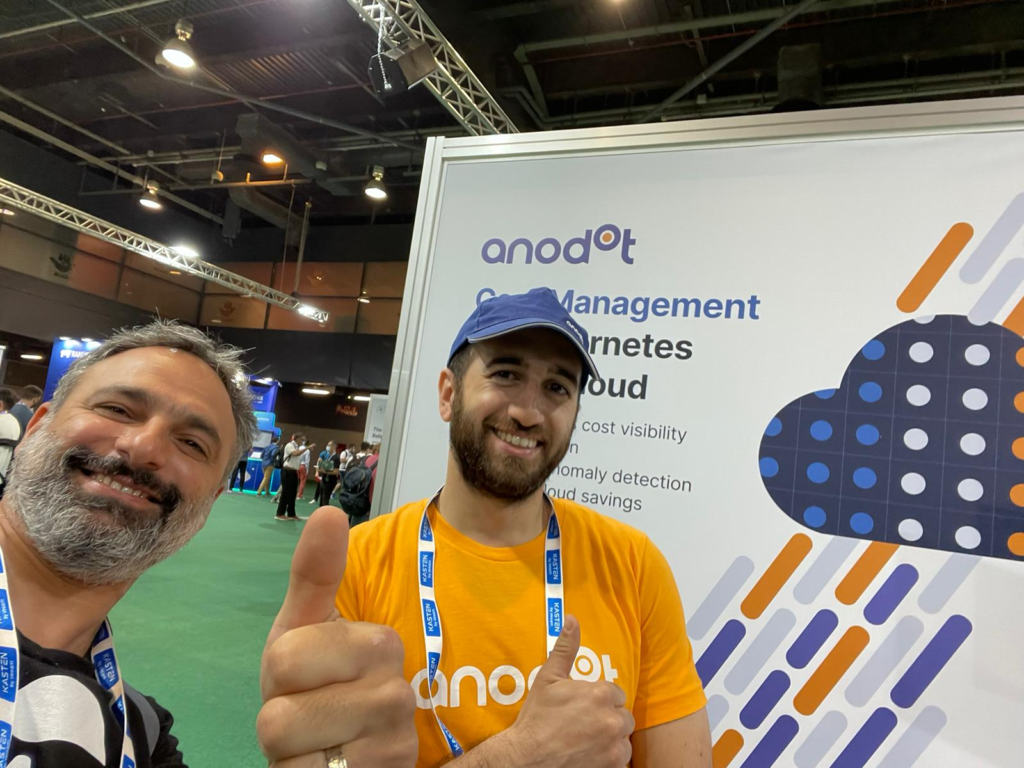
About the company: Anodot applies AI to deliver autonomous analytics in real time, across all data types, at enterprise scale. Unlike the manual limitations of traditional Business Intelligence, they provide analysts mastery over their business with a self-service AI platform that runs continuously to eliminate blind spots, alert to incidents, and investigate root causes. Anodot has nearly 100 customers in digital transformation industries like eCommerce, FinTech, AdTech, Telco, and Gaming, including Microsoft, Lyft, Waze, and King. (Source: Anodot)
Check out our show floor recaps from Cybertech Global TLV 2022 and AWS re:Invent as well to learn about other transformational tech companies disrupting the cloud computing space.

The Cybertech Global TLV 2022 Expo Floor Recap
Attending conferences is one of the best ways to see what’s cutting-edge in tech—and our first visit to KubeCon and…
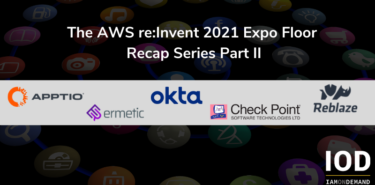
The AWS re:Invent 2021 Expo Floor: Coolest Technologies in Cloud Security
Attending conferences is one of the best ways to see what’s cutting-edge in tech—and our first visit to KubeCon and…

Kubernetes as a service is becoming a popular solution for many cloud customers. This should come as no surprise considering most companies are interested in leveraging the benefits of managing clusters without hiring more highly technical employees in-house. As Kubernetes as a service grows, companies need reliable, cloud-native backup services to protect their data. That’s where CloudCasa comes in.
This SaaS backup solution makes data security and recovery easy for organizations, without implementing new infrastructure or hiring in-house experts. While talking to COO Sathya Sankaran, we learned that most of their customers also use managed multi-tenancy environments like Amazon Elastic Container Service for Kubernetes (EKS) or Azure Kubernetes Services (AKS) to host their clusters.
During the conference, the CloudCasa team offered live office hours and answered questions on self-service recovery in multi-tenant environments. They even offered one lucky attendee a free e-scooter for joining!
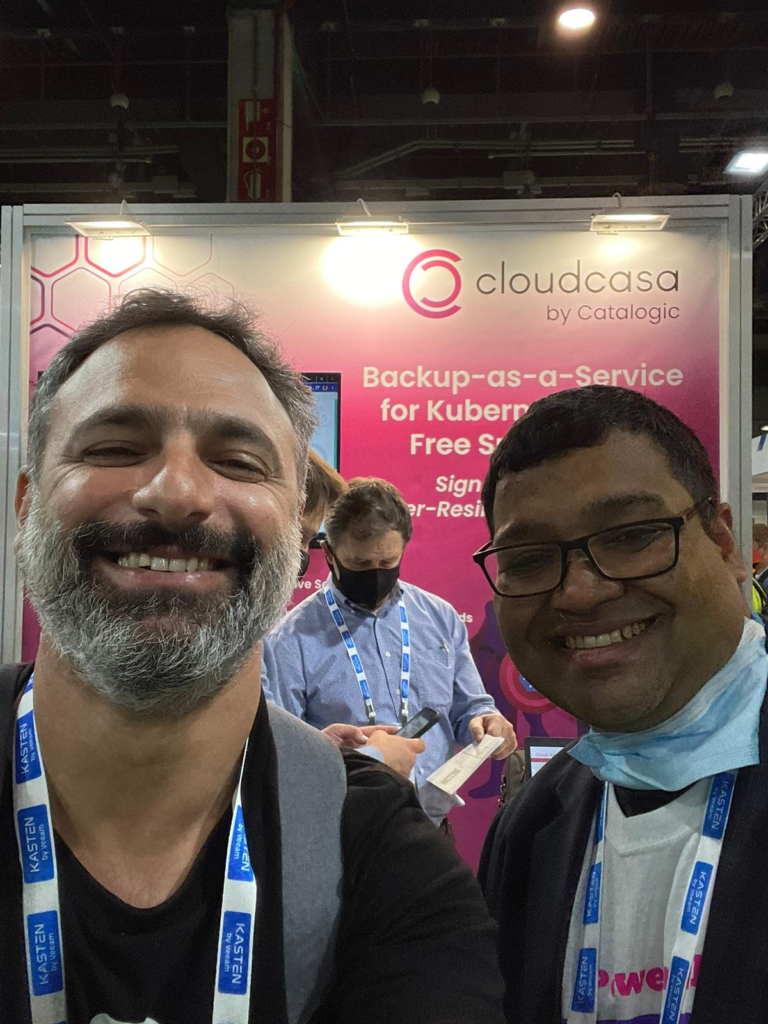
About the company: CloudCasa is a Kubernetes backup and recovery service with free security scans. It’s a powerful, scalable, cyber-resilient service for developers, DevOps, and IT Ops to back up, recover, and migrate Kubernetes clusters and data. Get cross-cluster, cross-region, cross-account, and cross-cloud data recovery and migration. (Source: Cloudcasa.io)

Stopping at the giant, bright white VMware booth was a must on my first visit to KubeCon. After all, the VMware team was all over the conference schedule, clearly demonstrating their expertise in all things Kubernetes and cross-cloud management. These presentations—on subjects like Gateway API, cloud-native buildpacks, CNCF resources, and more—gave in-person attendees a lot to consider.
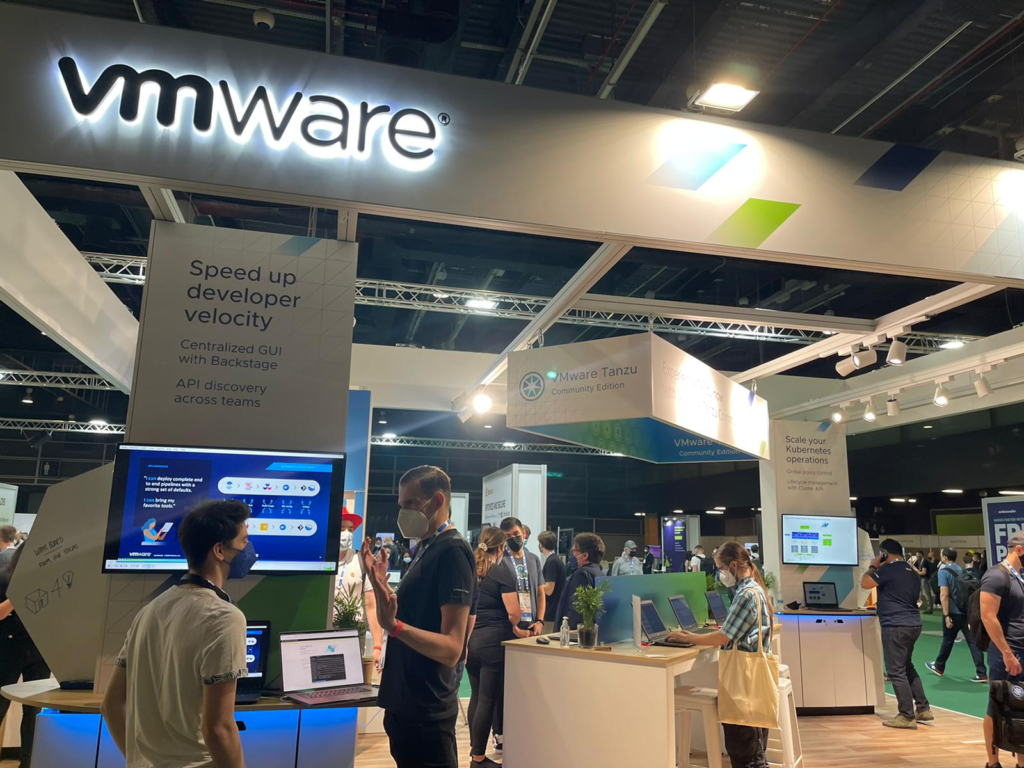
As a Diamond sponsor for the conference, VMware’s large booth had tons of demonstrations showing how their platform allows users to create cloud-native apps, update existing apps, and serve apps across any cloud. Plus, they showed how their cloud infrastructure services make it easy to design a consistent environment for easy app modernization and multi-cloud operations management.
About the company: VMware is a leading provider of multi-cloud services for all apps, enabling digital innovation with enterprise control. VMware streamlines the journey for organizations to become digital businesses that deliver better experiences to their customers and empower employees to do their best work. Our software spans App Modernization, Cloud, Networking & Security, and Digital Workspace. (Source: VMware.com)

It was exciting to hear about this company working on internal cloud platform design. Upbound—the founders of the open-source Crossplane framework—are creating a platform that enables better data security through cloud-native control planes. With Upbound, you can control how your dev team interacts on public clouds, provision a database, and even tweet about that straight from the platform.
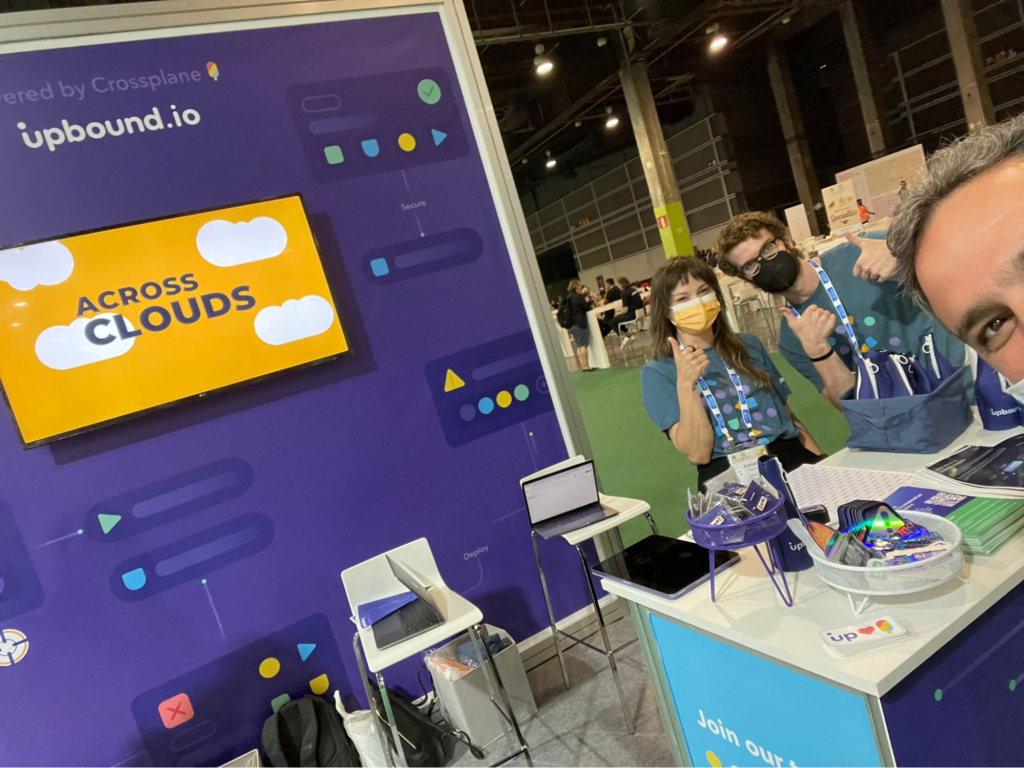
Unfortunately, when we visited their brightly colored booth, we didn’t get to see their product in action. But, we think this is a product to watch moving forward. The team—including Staff Software Engineer Daniel Mangum—also offered multiple workshops and presentations to help attendees better leverage Crossplane alongside other open-source frameworks.
About the company: Upbound is the easiest way to build your internal cloud platform. Our mission at Upbound is to enable a new era of infrastructure management that is automated, reliable, and efficient and empowers application teams to accelerate innovation by delivering software faster. (Source: Upbound.io)

This newcomer to the K8s world specializes in supporting small and medium cloud-native businesses. With possibly the brightest booth on the showroom floor, the neon green design and royal blue signage drew us in. However, what kept us engaged was the interesting work they’re doing to support everyone — from large multinational enterprise customers to new, “born-in-the-cloud” SMEs — across multiple industries to effectively protect data through continuous restore features. This was demonstrated to me by Senior Director and Global Head of Field and Partner Marketing LouLou Healey.
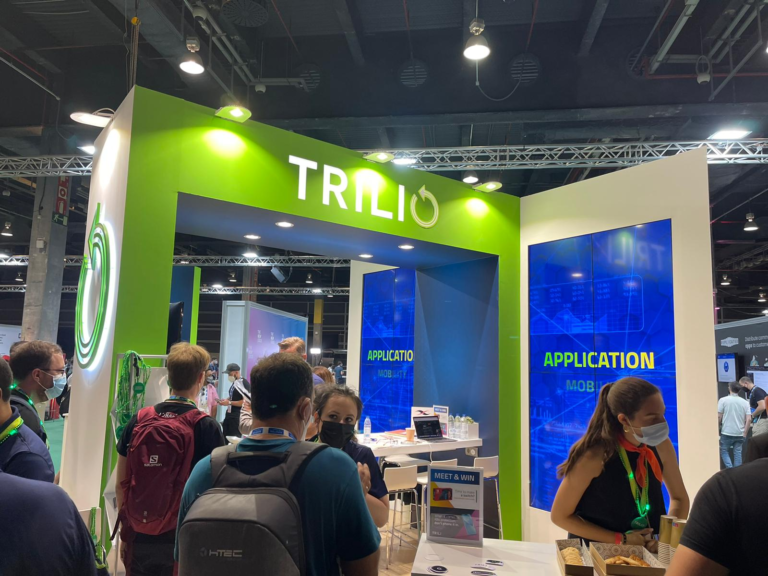
While we visited with the Trilio team, we learned about their TrilioVault technology (and sipped on a delicious free espresso drink generously offered to booth visitors). Trilio is a cloud-, storage-, and K8s-agnostic solution that supports and works well with customers using a variety of multi-cloud infrastructure deployments—most often, on-premises and one to two public/edge cloud environments. Their new Continuous Restore supports multi-cloud environments, but it’s especially applicable to organizations looking to easily move data and applications across public cloud environments for cost, performance, and security purposes.
About the company: Trilio’s platform, TrilioVault, delivers a modern data protection experience that gives customers more power and control over their cloud and container environments. Organizations of all sizes, from well-known brands to ambitious startups, rely on our cloud-native data protection software to manage and back up their applications so they can meet their service level agreements (SLAs) and compliance requirements, as well as recover from planned or unplanned outages. (Source: Trilio.io)
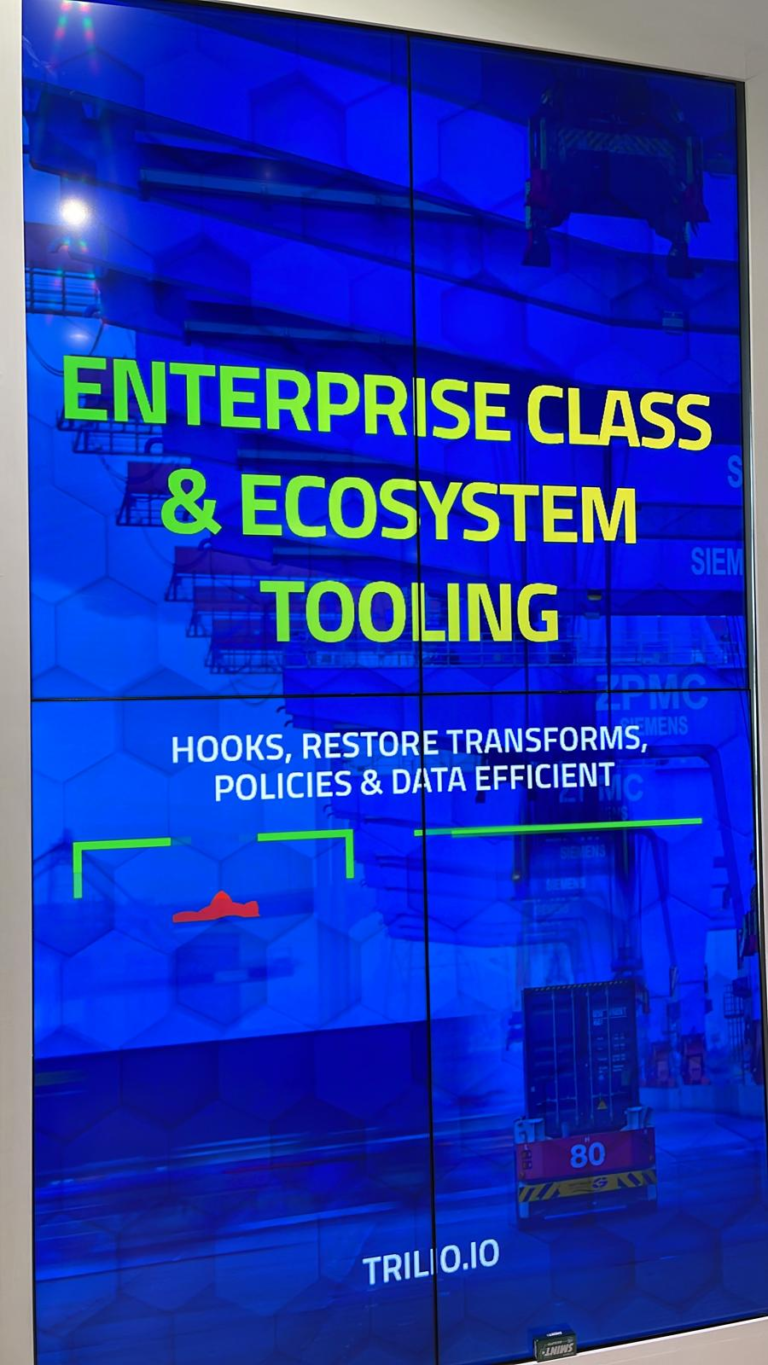

Like VMware, there was no way we would miss a chance to meet the team at Cisco. Even though the old-school industry leader maintained a small booth on the show floor, they had a large presence at the conference, demonstrating their expertise in full-stack observability across hybrid environments. Aside from recording podcast episodes from their booth, the company also presented a keynote speech on going beyond building systems to developing communities.
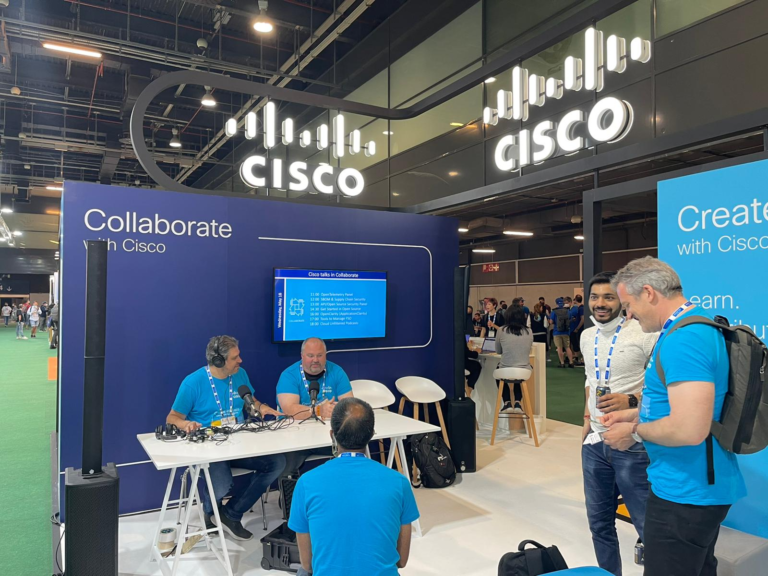
As another Diamond-level sponsor, the Cisco team was invited to host an assortment of talks and working groups. Plus, they participated in panel discussions to help attendees dive deeper into service meshes, label standardization, and more. It was great meeting these guys and hearing them talk shop about Kubernetes.
About the company: Cisco (Nasdaq: CSCO) is the worldwide leader in technology that powers the internet. Cisco inspires new possibilities by reimagining your applications, securing your data, transforming your infrastructure, and empowering your teams for a global and inclusive future. (Source: Cisco.com)
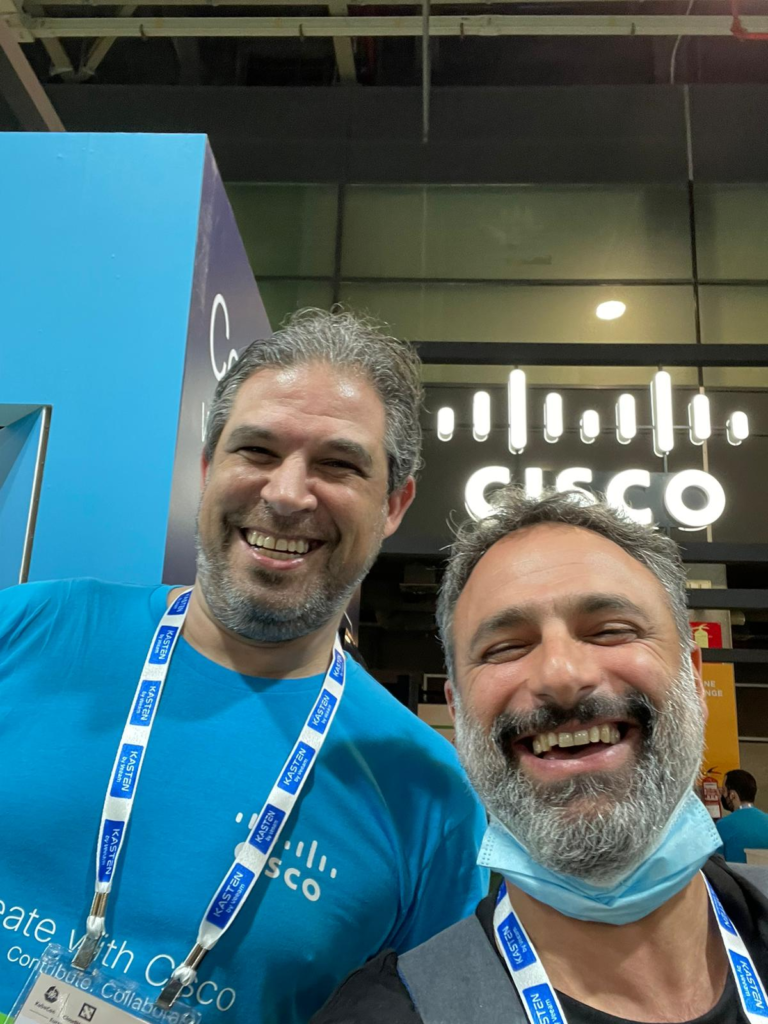
What’s Next in the K8s World?
Visiting Valencia for KubeCon + CloudNativeCon 2022 was a great experience. This conference is a must-visit for any practitioner exposed to Kubernetes. We were impressed by how easily they filled five days with engaging workshops, thoughtful panel discussions, and groundbreaking keynotes all about Kubernetes security!
As a leader in creating B2B tech content, it’s essential that all of us at IOD stay on top of the latest technology. During the conference, we got to see firsthand all the interesting work happening in this rapidly growing industry. Deepening our understanding of the competitive landscape and seeing what industry leaders are doing gives our team the insight we need to continue helping our clients create exceptional tech content.

